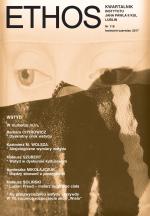 zobacz powiększenie | DOI 10.12887/30-2017-2-118-11 Roman DROZD – Truth and Forgiveness: The Meanders of the Polish-Ukrainian Dialogue Cena brutto: 7,00 PLN za szt. |
|
There are two standpoints in the Polish-Ukrainian dialogue. The first might be termed as ‘to forgive and ask forgiveness.’ Its followers, guided by the Christian teaching on love and forgiveness, believe that the border between ‘the executioner’ and ‘the victim’ in the Polish-Ukrainian conflict is vague, in particular in the context of the national groups involved in the controversy. No nation is entirely evil or good. Therefore, the Ukrainians were not only ‘executioners’ of the Poles, but also their ‘victims.’ Poles simultaneously acted as their ‘torturers’. Considering this mutual detriment, the proponents of this standpoint believe that only mutual apology and forgiveness can lead to the Polish-Ukrainian reconciliation and that the act of such reconciliation must not involve harming the dignity of either Ukrainians or Poles or humiliating either nation. The alternative position is held by those who believe in ‘being released by the truth.’ While the supporters of this view also stress the need for the Polish-Ukrainian reconciliation, they hold that it may be accomplished on certain conditions only, one of them being the apology from the other side. To them, the border between ‘the executioner’ and ‘the victim’ is very clear. Thus, the Poles representing this standpoint believe it was the Ukrainians who were the executioners. Likewise, the Ukrainians holding this view believe the Poles only to have been the murderers. As a result, either party considers itself the victim, the Polish-Ukrainian conflict being seen through this ‘singular’ lens only. The losses of the respective national group are magnified, while those of the other side are usually underestimated or altogether ignored. The actions of the other party are termed as ‘genocide,’ while the acts committed one’s own party are justified as retaliation even if they involved killing women and children. Throughout the history of the Polish-Ukrainian dialogue, the two standpoints compete with, but also affect each other. Nowadays, however, the initiative seems to belong to the proponents of seeing one’s own national harm only, which is reflected in the shallowness of the reflection on the historical events in question, as well as in the lack of compassion for the victims of the conflict both on the Polish and the Ukrainian sides. The current situation in the dialogue about the Polish-Ukrainian conflict contributes to strengthening the voice of the opponents of any reconciliation in this matter who express their views by committing acts of profanation and destruction of Polish and Ukrainian memorials in both countries. Keywords: the Poles, the Ukrainians, dialogue Contact: Zakład Studiów Wschodnich, Instytut Historii i Politologii, E-mail: roman.drozd@apsl.edu.pl Pliki do pobrania: » 118_Drozd.pdf | |
